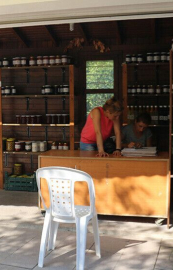Women, Life, Freedom. These are the words that guide the feminist revolution throughout south-west Asia. Even after surviving horrific violence, even in the face of sustained oppression, the Armenian village of Vak’ëf (known in Turkish as Vakıflı) has shown how women, life and freedom can endure and prosper. Here we present an account by Red and Black Yerevan, formerly known as the Black Banner, on the women’s cooperatives of Vak’ëf.
Anyone with any interest in Armenian history has probably heard of Musa Dagh. This mountain became a symbol of Armenian resistance during the genocide.
Until 1915, there were six villages in the vicinity, whose inhabitants the Young Turks planned to deport to the Syrian desert. However, 4,100 Armenians managed to take refuge on the mountain peaks and, under the leadership of Movses Ter-Galustian, continued their defence against the Turkish units for some seven weeks until they were rescued by five French warships and evacuated to the Egyptian city of Port Said.
This legendary self-defence served as the inspiration for the novel The Forty Days of Musa Dagh by the Austrian Jewish writer Franz Werfel, which he wrote in 1929 while travelling in the Middle East.
After the world war ended and the region was annexed to the French colony of Syria, many Armenians returned to their villages in 1919. But in 1939, Kemalist Turkey annexed the Hatay region and the inhabitants of five of the six Armenian villages again decided to flee.
The only remaining Armenian village in the region is Vak’ëf, which still exists today and is home to around 140 people. In 2005, five of the village’s Armenian women decided to set up their own co-operative. They wanted to promote their self-organisation and economic independence and help develop their village.
Today there are 39 women working in the cooperative. They grow mulberries, blackberries, citrus fruits and olives in their fields and gardens, produce all kinds of preserves, oil, soap and wine and sell their organic products in the courtyard of the Armenian Apostolic Church of St Marianna. The church, consecrated in 1895, is the centre of the village. It was restored in the 1990s and an extension was added to the church in 2005.
Women in Vak’ëf attach great importance to the quality of their goods as the basis of their freedom and autonomy. Sustainable production through a more efficient use of cultivated land through environmentally friendly methods, direct and solidarity action without intermediaries are very important.
They operate on the principle of “women for women” and have a collective infrastructure. “For example, we make bitter orange jam, our famous orange flower jam and concentrated syrup based on our grandmother’s recipe. Now we have perfected the product and expanded our range to include liqueurs. We make it from mandarin in particular.” Few of these trees remain in Vak’ëf, no more than one or two in each orchard. “Unfortunately, they are in danger of disappearing,” says Kartoon.
The women in the village cooperative are also its owners and decide for themselves how they want to use the profits they share. Kartoon said: “We are a family here and a small model village.”
Vak’ëf produces organic, fair and ecologically sustainable products, which have already won several awards in Turkey and other European countries. It is paying off: around 65,000 people from all over the world visit the village every year. Tourism has become the main source of income in Vak’ëf. The cooperative members are happy: the more people who visit the village, the more support opportunities for the women.

